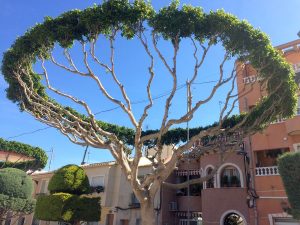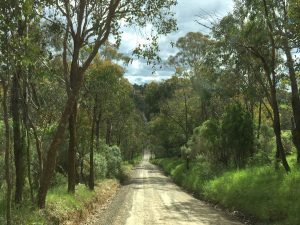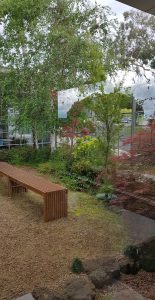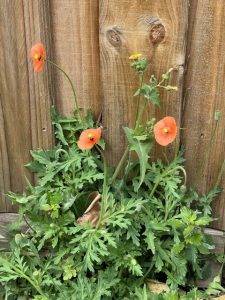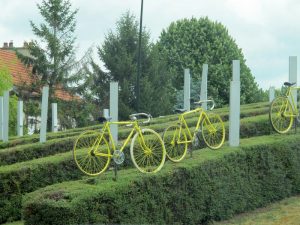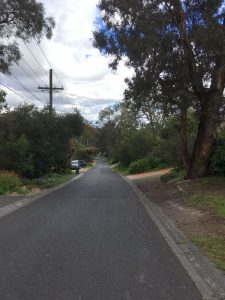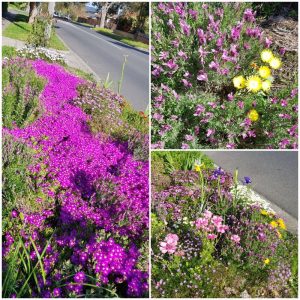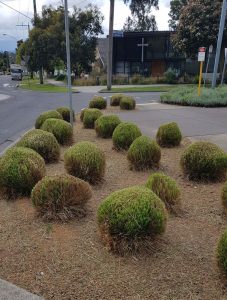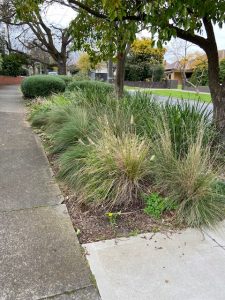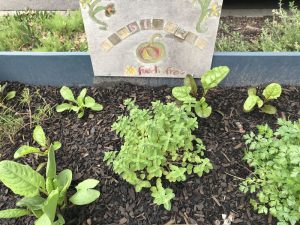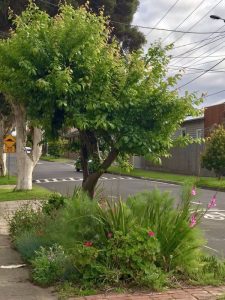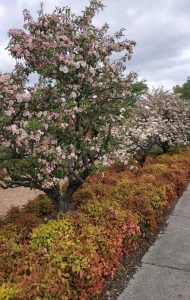Thanks to all the people who have contributed to this week’s newsletter: Carolyn Speed, Cathy Romeo, Choon Yin Yeok, Chris Kent, Elissa Hunter, Evan Gellert, Jon Buttery, Kathryn O’Connell, Kerin Tulloch, Lee Hirsh, Lynn Wallace, Monique Decortis, Penny Smith, Pam Jenkins, Rita Varrasso, Soo Mei Leong and Suzy Georges.
It is great when people contribute material for the newsletter. It can be anything so long as it is food-related: ask a question, provide a tip, discuss an issue, submit a photo, send in a recipe, etc. Email us with your contribution(s).
This week’s farmers’ markets
Thursday: Alphington Midweek Farmgate.
Saturday: Abbotsford and Coburg. Not Wonga Park.
Sunday: Alphington, Eltham and Heathmont.
The avocado tree, veggie bed and big eucalypt tree (by Evan Gellert)
This is a story of competition for sustenance and moisture in my Eltham garden. The big eucalypt tree won against the avocado tree, but the veggie bed was saved by pond liner.
Six years ago, I planted an avocado tree (a Gwen?) about 6 metres from the base of a large eucalypt, inside its drip zone. I thought that this location would suit the avocado as it would be screened from some of the Melbourne summer sun and from winter frosts. Unfortunately, the bigger threat was underground in the form of eucalypt roots.
At about 3 years, the avocado looked great and grew several large avocados (which unfortunately dropped prematurely after frost damage). This frost damage finally throttled the tree.
The replacement seedling in 2018 was an avocado (a Bacon) which never did well, and the problem became evident as massed rooting throttling the avocado roots. The rooting was so thickly matted that it became impractical to stir tree food into the avocado soil base.
Roots also invaded the adjacent raised garden bed used for our zucchini and cucumber. I applied a major intervention two winters ago by converting that ground contact bed into a giant pot by installing pond liner to keep the eucalypt roots out plus I added an above ground drainpipe. It works well and we have successfully grown zucchini and cucumber here over about 5 seasons without crop rotation, supplementing the soil annually with compost. The cucurbits love the room to spread runners beyond the raised bed.
The avocado tree was a dream that, in practice, failed. After about 6 years of summer watering, feeding, incessant frost protecting and sun-screening, I have given up. We now buy our avocados instead.
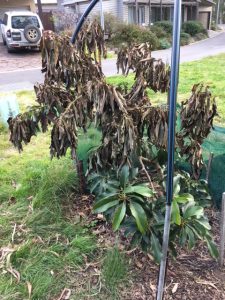 |
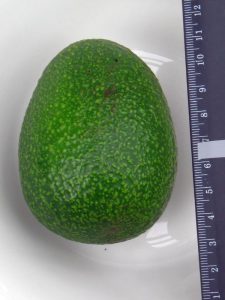 |
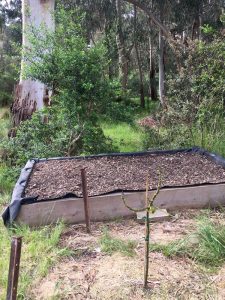 |
| Original avocado tree with frost damage | A premature avocado from the original tree | The replacement struggling tree with a large eucalypt behind it |
* * * * *
Have any newsletter readers successfully grown avocados (i.e. obtained full grown fruit)? In The complete book of fruit growing in Australia, Louis Glowinski says that it is perfectly possible in Melbourne and, indeed, says that it is easier in Melbourne than elsewhere because our climate keeps both the male and the female flowers open all day. Email us with your success story.
My garlic woes (by Pam Jenkins)
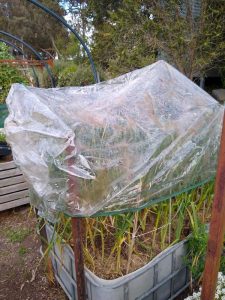 I have read in many places that garlic is easy to grow and has very few pests and diseases. Well, there is always the exception that proves the rule. I sometimes wonder why I always have to own that exceptional garden!
I have read in many places that garlic is easy to grow and has very few pests and diseases. Well, there is always the exception that proves the rule. I sometimes wonder why I always have to own that exceptional garden!
In recent years, we have had lots of rain. Last year I had to dig out my garlic really early as the soil got saturated and the garlic rotted at the neck. You don’t get much of a crop if you dig it out early and, because it is a fungal infection, what you manage to save doesn’t keep well. I preserved my much diminished crop by dehydrating it.
This year, after the last heavy fall of rain, a couple of plants fell over and I dug them up to discover that the same was happening to this season’s crop.
More rain being forecast, I had to think of a solution fast! In my resources area, alternatively known as my useful junk store, I found a plastic cover from a mini hothouse that had succumbed to the wind and have now used it as a makeshift rain shelter for the garlic. The top of the soil is quite dry even after the 25 mm rain that we received over the last two days and the remaining garlic is still standing. Fingers crossed that it will complete its cycle and I will once again have garlic plants in my store cupboard.
Jon’s podcast of the week
I think that we all experiment to find a method of composting that suits us. I’d tried bokashi but hadn’t really taken to it. After listening to this podcast, I’m going to give it another go. The author says that the end result is nutritionally good and that you can feed it to your worms or chooks.
More on cape gooseberries
Following Megan Cassidy’s article last week, Penny Smith has written in to say that cape gooseberry can be weedy. “I grew it a few years ago and, while I was a bit distracted, it threatened to take over my backyard. I pulled it all out but am still getting seedlings popping up. I have also seen it as a weed along the Merri Creek.“
Daleys Fruit say “It is not a dominant weed but it can be somewhat of a nuisance when working to restore native vegetation areas.“
More of Elissa Hunter’s miniatures
The most popular item (by far) in last week’s newsletter was the photo of Lynn Wallace’s daughter’s miniature garden shed. I therefore asked Lynn a) if she had any more photos to share and b) what is her daughter’s name?
Lynn’s daughter is called Elissa Hunter.
Elissa’s first miniature is of a French patisserie shop and florist. There are three photos:
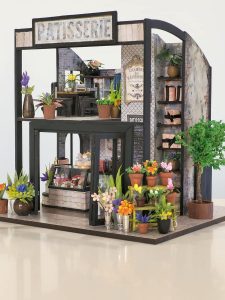
|
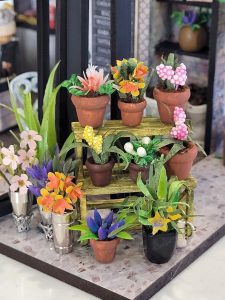
|

|
| The overall shop | A close up of the deli counter | A close up of the flowers |
Elissa’s second miniature is of a veggie garden outside of a house. There are four photos:
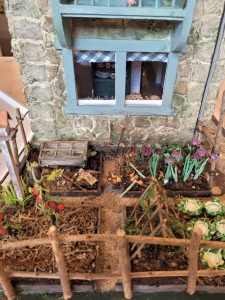 |
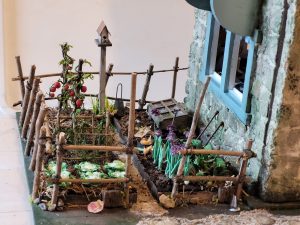
|
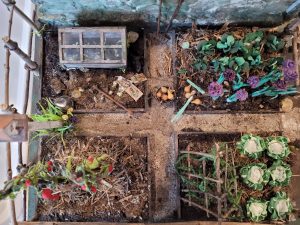
|
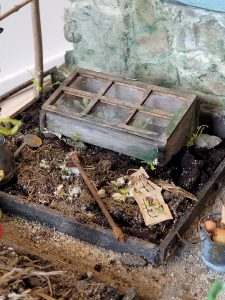
|
| The overall garden and house | A side on view | A top down view of the garden | A close up of the mini greenhouse |
Of the first photo, Lynn says “I love the view through the kitchen window. Spot the apple pie!“
Some unusual edibles that you could grow
Pentridge Community Garden in Coburg have written an article about 5 unusual things that they are growing, namely daikon, hops, luffa gourd, romanesco and tomatillo.
Where to buy tromboncino seedlings
A few weeks ago, I wrote an article on why you should grow tromboncino this summer. Since then, a number of people have asked me where they can buy tromboncino seedlings and I now have an answer: Organic Fix, 937 Main Road, Eltham. They are in punnets and are therefore very cheap.
Ever need access to a commercial kitchen?
Melbourne Farmers Markets have a commercial kitchen in Alphington which is available for hire by “any food business who has a ‘registered kitchen space’ through their local council“. Start a conversation by completing their expression of interest form.
France to ban plastic packaging for fruit and vegetables
Earlier this year, France banned plastic straws, cups and cutlery. Over the next five years, they will progressively be banning plastic packaging for fruit and vegetables, with such packaging being banned from 1st January, 2022 for eggplants, leeks, round tomatoes (but not cherry tomatoes), apples, bananas, oranges and around 20 other fruits and vegetables. Cherry tomatoes, green beans and peaches will then follow by June 2023; endive, asparagus, mushrooms and cherries by end 2024; and raspberries and strawberries by June 2026. A key challenge will apparently be how to stop potential customers touching the produce when it is not packaged or only loosely packaged using cardboard. Read more. Thanks for the heads up, Monique Decortis!
Guy’s veggie growing tip of the week – grow capsicums and chillies in pots
There are two big reasons why you should grow your capsicums and chillies in pots rather than in your veggie patch.
The first reason relates to frost tenderness. Capsicums and chillies are both perennial, albeit short-lived (typically living for around three years). But they are also frost tender and are typically killed off by the Melbourne Winter. So, if you want to get full value from your capsicums and chilli, grow them in pots and put those pots in a warm place (e.g. a greenhouse) during Winter before taking them out again in the following Spring.
The second reason relates to crop rotation (about which Robin Gale-Baker wrote an article a few months ago). One of the annoying points about crop rotation is that you have to allocate equal space in your veggie patch to each of the groups in the rotation. So, for example, you have to have equal space for solanums (capsicums, chillies, eggplant, tomatoes and potatoes) as for legumes (beans and peas).
But most people want to grow lots of tomatoes and don’t want to lose space for these because of space taken up by capsicums and chillies (with all three of these veggies being grown over the same Spring/Summer period). Growing your capsicums and chillies in pots resolves this issue.
A final point: use large pots! Both capsicums and chillies grow much better in large pots than in small pots. I use 330mm (18 litre) pots.
Read my previous veggie growing tips.
The photo competition
The results of last week’s competition
The theme was ‘nature strips or other streetscapes’ and attracted 14 entries. Thanks, everyone!
The winner, as judged by our panel, was Chris Kent’s photo of a street in Spain.
Commendations to Cathy Romeo’s photo of a road in Research and to Kathryn O’Connell’s photo of the Japanese garden at Watsonia Library.
This week’s competition
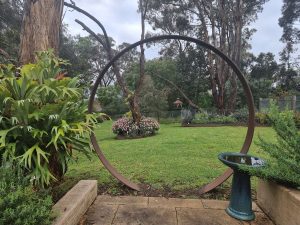 As we are still (as we speak) in lockdown, we are going to have another photo competition.
As we are still (as we speak) in lockdown, we are going to have another photo competition.
The theme this week is ‘garden art’, as suggested by Cathy Romeo. ‘Art’ in this context, has a wide definition and you can submit anything that you concider to be ‘artistic’. Email your photos together with some words about them.
To get you started, here is a piece of art from my garden. It is by Tim Reed from Bend of Islands and is effectively the entrance to my back garden. Although it looks like a complete circle, this is actually an illusion as there is a big metal plate just under the grass to keep the whole thing stable.
Beef and potatoes (by Suzy Georges)
Ingredients
500g beef eye fillet cut into medium-size cubes
3 tablespoons olive oil
one onion, chopped
2 cloves of garlic, chopped
400g potatoes cut into medium-size cubes, the same size as the meat (I use waxy potatoes as they both hold their shape and soak up the flavour)
1 tablespoon paprika (or smoked paprika)
4 tablespoons balsamic vinegar
1 tablespoon plain flour
1½ cups of water
salt and black pepper to taste
Method
Although the meat and potatoes need to be cooked separately, only one pan is required.
Prep everything before you start cooking.
In a heavy bottom pan, put 2 tablespoons of olive oil, cook the potatoes for 5-7 minutes (don’t stir too much), put aside in a warm spot lower the heat and let them crisp a bit.
Sear the meat in the same pan after you take the potatoes out. Then remove the meat from the pan.
Add the remaining oil to the pan and fry the onions for 1 minute then add the garlic. Keep stirring until the onion and garlic are translucent.
Add the flour and stir well.
Mix the water and the vinegar together then add it to the onion and garlic mix. Stir until it comes to the boil.
Add the meat and the potatoes, mix gently, cover the pan and leave it on low heat until it is cooked well (not too long otherwise it will stick to the pan).
Joke (or pun) of the week
Submitted by Lee Hirsh: Why was the celery given a restraining order? Because it was stalking the other vegetables.
Upcoming face-to-face events
We’re still not generally advertising face-to-face events, but here is one outdoor event which is scheduled for after when such events are allowed.
Plant sale; Sunday, 7th November, 8.30am-1pm
Organised by Hurstbridge Sow & Grow Garden Club. There will be a wide range of interesting, unusual and drought tolerant plants for sale. Saunders Automotive Carpark, 941 Main Road, Hurstbridge.
Upcoming online events – an update about non-working hyperlinks
I’ve now worked out a way of linking to Whitehorse Manningham Libraries’ events that doesn’t use the (non-working) Spydus hyperlinks so it is now only the Yarra Plenty Regional Library events that can’t be included in these newsletters until and unless someone from the library tells me how avoid their non-working Spydus hyperlinks.
Upcoming online events – newly announced
If you know of an upcoming online event that you would like to see included in this newsletter, email me with either the details or a link to the details.
Cook Indian by the creek; Friday, 22nd October, 5.30-7pm
$49. Aloo jeera (cumin roasted spices potatoes) and punjabi chicken (chicken and herbs with fenugreek leaves). Book by Facebook Messenger.
Fussy eaters – meal ideas from 0 to adolescence; Thursday, 28th October, 10-11am
Organised by Eastern Regional Libraries. Free. Presenter: Su-Ling, who is a dietitian. Learn how to create harmonious meal times and how you can take the stress out of feeding children. Read more and potentially book your place.
Preventing and treating pesky pests organically; Saturday, 30th October, 11am-12.30pm
Organised by My Smart Garden. Free. Presenter: Karen Sutherland from Edible Eden Design. Learn about managing pests in your edible garden using organic methods. The workshop will cover prevention and treatment of common garden pests, as well as Queensland Fruit Fly. Read more and potentially book your place.
Upcoming online events – previously announced
Spring picnics (thermomix); Friday, 22nd October, 7.30-9pm
Organised by Thermotess, Tess Murray. Free. Presenters: various. The menu will includes: minted mosco mule (a cocktail), gourmet crackers, beetroot salad with raita dressing, peanut soba noodle wonton cups, peanut dressing, mini spiced lamb pies and pecan pie cheesecake cups. Read more and potentially book your place.
Composting at home; Saturday, 23rd October, 10-11am
Organised by Maroondah Council. Free. Learn how to set up, maintain and use a compost bin at home. Read more and potentially book your place.
Worm farming and Bokashi at home; Saturday, 23rd October, 11.30am-midday
Organised by Maroondah Council. Free. Learn how to set up, maintain and use a worm farm and Bokashi bucket. Read more and potentially book your place.
Home composting for beginners; Saturday, 23rd October, 2-3.30pm
Organised by Edendale Farm. Free. Learn the basics of home composting including how to set one up and maintain it, the simple recipe for success, what to add and what not to add. Read more and potentially book your place.
Growing fruit and veggies in small spaces; Sunday, 24th October, 10.30am-midday
Organised by Bulleen Art and Garden. $35. Topics will include fruit, vegetables and berries for small spaces, growing produce in pots and containers, maximising productivity in any size space, and plant selection. Presenter: Angelo Eliades. Read more and potentially book your place.
Composting for kids; Sunday, 24th October, 11-11.45am
Organised by My Smart Garden. Free. Presenters: Charlie Mgee (musician) and Brenna Quinlan (permaculture illustrator). This will be a fun and musical tour of life in our soil, learning about how we can keep it healthy through composting and worm farming. Read more and potentially book your place.
Grow more, work less; Monday, 25th October, 2.30-3.30pm
Organised by Whitehorse Manningham Libraries. Free. This workshop will cover soil health, seeds, seedlings, growing fewer weeds and succession planting. Presenter: Alison Sizer from Urban Harvest. Read more and potentially book your place.
Setting the right price for product; Tuesday, 26th October, 10-11.30am
Organised by Business of Food. $45. Learn about accurately costing your product and setting a retail price. Read more and potentially book your place.
Wicking bed workshop; Wednesday, 27th October, 7-8pm
Organised by My Smart Garden. Free. Presenter: Craig Castree. Learn about permaculture design principles, how to conduct a site analysis and working with vertical gardens, pots and containers plus how to make the most of your space to increase your harvest. Read more and potentially book your place.
Preparing for a summer veggie crop; Wednesday, 27th October, 7-8.30pm
Organised by Boroondara Council. Free. You will learn about: garden maintenance and preparation; selecting what to plant and when to plant it; growing summer veggies in pots; managing hot weather, including mulching and smart watering; improving productivity sustainably, including crop rotation and companion planting; and soil preparation and management. Read more and potentially book your place.
Herbs for the kitchen garden; Thursday, 28th October, 6-8pm
Organised by CERES. $50. Learn the best herbs for sunny or shady spots, which grow well pots and what to grow when. Discover rules of thumb to know which herbs you can take cuttings from and which grow best from seed. Presenter: Carol Henderson. Read more and potentially book your place.
Keeping backyard chooks; Thursday, 28th October, 7-8pm
Organised by Whitehorse Manningham Libraries. Free. This workshop will cover chook health, nutrition, housing, protection from predators and pests, the benefits of having chooks and Council bylaws. Presenter: Ella from Chooktopia. Read more and potentially book your place.
Design a small and productive garden; Wednesday, 10th November, 6.30-8pm
Organised by My Smart Garden. Free. Presenter: Kat Lavers. Learn how to grow herbs in whatever space you have, from the smallest balcony to the biggest garden, in dry areas, wet areas, shade or sun, outside or indoors. They will cover how to plant, propagate, harvest, dry and store herbs. Read more and potentially book your place.
Composting at home; Wednesday, 10th November, 7-9pm
Organised by Banyule Council. Free. Learn about all the tips and tricks to make great compost. Find out about different containers, worm farming and Bokashi buckets. Read more and potentially book your place.
Otao Kitchen cooking classes; various dates
Otao Kitchen have moved many of their cooking classes online including chinese, dumpling making, indian, indonesian, japanese, korean, thai and vietnamese. Read more and potentially book your place.

